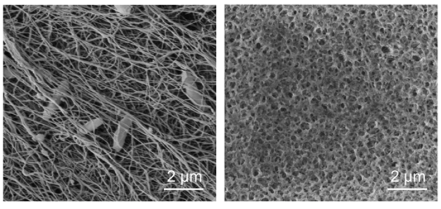FOR IMMEDIATE RELEASE
ACS News Service Weekly PressPac: January 19, 2022
Kombucha water filters can resist clogging better than commercial options
"Living Filtration Membranes Demonstrate Antibiofouling Properties"
ACS ES&T Water
Commercially available ultrafiltration membranes that purify water are expensive and get clogged easily by particles and microorganisms. Recently, living filtration membranes were reported as an alternative sieving material. Grown from kombucha cultures, the filters are dense, stacked sheets of bacterial cellulose. Now, researchers reporting in ACS ES&T Water show that these living membranes are more resistant to clogging and biofouling, making them more efficient and less expensive to use than conventional ones.
Decontaminating water so that it’s safe to drink requires materials that remove impurities and disease-causing pathogens, including bacteria, parasites and viruses. Polymer-based filters with tiny holes can fulfill this need, but their lifetime is limited because their pores get plugged easily. Some contaminant microorganisms speed up this process by producing sticky substances that create a glue-like biofilm, coating the inside of the membranes and blocking water flow. In a recent study, Katherine Zodrow and colleagues reported living membranes made of a permeable bacterial cellulose film that they grew from a symbiotic culture of bacteria and yeast (SCOBY), which is used to ferment tea into the popular drink kombucha. These membranes can be tuned to filter different sizes of particles and, because they’re alive, can heal themselves. Some of the microbes found in SCOBY belong to a family known to produce acetic acid, which can kill bacteria, including those that secrete biofilms. So, another team led by Zodrow wanted to see if living filtration membranes could resist fouling and last longer than commercial polymer membranes.
The researchers cultivated a kombucha SCOBY in a solution of sugar, black tea, distilled white vinegar and water. A thin permeable membrane of fungi and Acetobacter bacteria grew where the culture came into contact with air. Then, the team filtered water from two reservoirs and a river in Montana with both a living membrane and a commercial membrane made from two cellulose esters. While both materials clogged and filtered more slowly over time, the SCOBY-sourced membrane resisted fouling better and maintained faster filtering, especially with the dirtier and microorganism-laden water samples. Although a biofilm eventually formed in the living membrane, too, there were fewer microorganisms within that film. According to the researchers, this result could mean that the acetic acid-producing bacteria embedded within the material discouraged the growth of bacteria that contribute to biofilms. Based on these results, the team says that living membranes could be an inexpensive, biodegradable and effective way to treat water.
The authors acknowledge funding from the U.S. National Science Foundation, the Combat Capabilities Development Command Army Research Laboratory, an Institutional Development Award (IDeA) from the National Institute of General Medical Sciences of the National Institutes of Health and King Abdulaziz University.
###
The American Chemical Society (ACS) is a nonprofit organization chartered by the U.S. Congress. ACS’ mission is to advance the broader chemistry enterprise and its practitioners for the benefit of Earth and all its people. The Society is a global leader in promoting excellence in science education and providing access to chemistry-related information and research through its multiple research solutions, peer-reviewed journals, scientific conferences, eBooks and weekly news periodical Chemical & Engineering News. ACS journals are among the most cited, most trusted and most read within the scientific literature; however, ACS itself does not conduct chemical research. As a leader in scientific information solutions, its CAS division partners with global innovators to accelerate breakthroughs by curating, connecting and analyzing the world’s scientific knowledge. ACS’ main offices are in Washington, D.C., and Columbus, Ohio.
To automatically receive press releases from the American Chemical Society, contact newsroom@acs.org.
Note: ACS does not conduct research, but publishes and publicizes peer-reviewed scientific studies.
Media Contact
ACS Newsroom
newsroom@acs.org

View larger image

